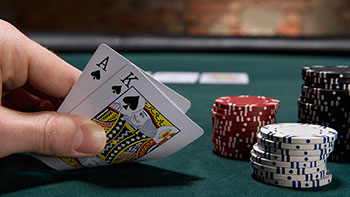Blackjack: Designed To Be Volatile
Long-shots happen more than you think
 Let’s say you walk up to a blackjack table, lay down $700, bet $100 per hand, and lose seven consecutive decisions. Is that unusual? What about losing eight decisions out of ten? How often does that happen?
Let’s say you walk up to a blackjack table, lay down $700, bet $100 per hand, and lose seven consecutive decisions. Is that unusual? What about losing eight decisions out of ten? How often does that happen?
Let’s say you’re dealt two ruby-red kings. Nice hand, right? What are the chances the dealer will tie you if he’s showing a 10?
You’ve been at the table for an hour and haven’t yet drawn a natural 21. Not once. Meanwhile, during the same hour, the dealer received six naturals. Is that typical, or is the game rigged?
Let’s say you play perfect blackjack basic strategy, and it lowers the casino’s edge to only 0.4%. Does that mean you have a nearly 50-50 chance of winning the next hand?
Your ability to play correctly and follow strategy depends in large part on your capacity to retain focus when unexpected things happen at the table. Anomalies are unnerving and distracting. Egregious strategic mistakes and catastrophic losses usually occur during the confused moments after a weird loss when a shocked player shakes his head and says, “Wait. What just happened?”
And here is the deep irony: Most of the events that people classify as remarkable are actually pretty common. Shock is unjustified because most surprises shouldn’t be so surprising. Here are some examples…
Unusual is Actually Typical
Seven consecutive losses seems pretty nasty, but it’s actually very common. In blackjack, it happens about 1.3% of the time, or about once in every 78 trials. It’s typical in sessions that last more than an hour. Contrast that with the probability of drawing aces for a split. The chances of that happening are only 1 in 221. How many times in your life have you seen A-A? So don’t feel abused when the casino sucks down seven consecutive bets.
The probability of losing 8 out of 10 is even higher. It happens about 1 in 12 trials (8.5% of the time). Yup, losing happens sometimes. But winning does, too. You have a 3.3% chance of winning 8 out of 10.
You and the dealer have an exactly equal chance of drawing a natural. Typically, it happens about three times in an hour, about once in every 21 hands. But sometimes you or the dealer will get lucky. About once every 12 hours (7.8% of the time), one of you will receive six or more naturals in an hour.
On the other hand, the probability for zero naturals in one hour is 5%. That means once every 20 hours or so, you’ll suffer through a bad stretch with no perfect combinations.
After a natural, the next best hand is 20. You’ll draw it about 11% of the time, or about seven times per hour. Usually, it’s a consistent winner, even against a dealer’s 10 or ace. But it ties a lot, about 1 in 3 times, when the dealer shows a 10. So don’t be frustrated by those ties!
Hands that deserve a double down occur about six times per hour (depending on the dealer’s upcard). You’ll draw a 10 to your 11 for a perfect 21 about 32% of the time in a single-deck game. However, multiple decks take a bite. The probability of drawing the perfect card drops to just 30% when the game has eight decks.
Naturals and other pat hands will be about 32% of your starting combinations, or nearly one third of your games. Hands of 11 or less and soft-drawing hands (containing an ace) will be 29% of your starting combinations. Unfortunately, stiff hands are the most common combinations. Cards that total 12 to 16 appear in 39% of trials.
A Slim Edge Does Not Mean 50/50
Let’s say you sit down to play blackjack for an hour. That’s about 60 hands, not including ties. Your chances of winning more than half of those hands (31 or more) are only about 24%. Surprised? This truth about blackjack is often misunderstood or unknown and it’s the main reason why basic strategy is so important. The house has an enormous automatic advantage in frequency. In a typical hour, the casino will win at least 32 hands, and you’ll win only 28. This effect is compounded as the hours add up.
Keep in mind that you and the dealer have an exactly equal probability of drawing a particular hand, but you must act first to stand or hit. If you bust, then the dealer wins even if the dealer also subsequently busts. The house advantage is entirely a result of this order of play.
So, your only way of winning money in the long run is to play an optimal strategy and make up the difference with higher payouts on naturals, doubles, and splits.
If naturals only pay 6:5, if you see a drought in naturals, if your doubling and splitting hands stop coming or they lose ingloriously, then you’ll take a hit in the bankroll.
Of course, it’s not all gloom and doom. Sometimes Lady Luck will kiss you sweetly. For example, flip it around, you have about 1 in 4 chance of beating the casino in frequency in one hour, plus the extra payouts you get for premium hands. And you have a 4% chance of beating the casino by a whopping 10 net decisions in one hour. That number seems slim, but it’s like all the other probabilities we covered. Play long enough, and you’ll see it happen many times.
So be prepared, and don’t be shocked when you win a lot or lose a lot. Blackjack is designed to be volatile. Your goal is to ride those big waves. Keep your cool. Stick to strategy. Lose less, win more, and profit.


